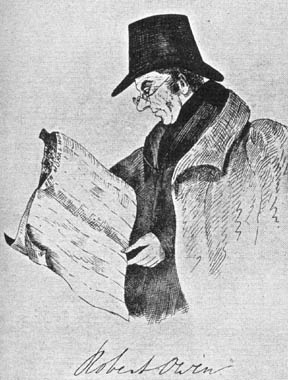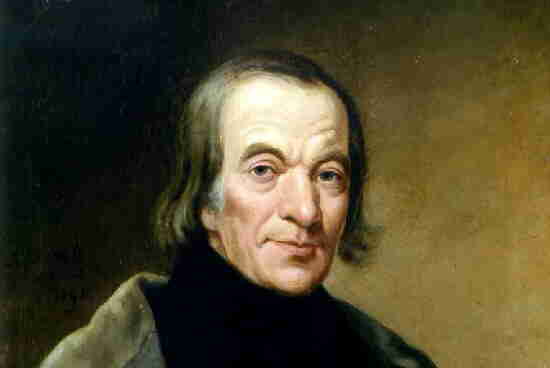Between 800 and 900 people arrived during the spring of 1825, and in a newly established newspaper, the name "Harmonie" was replaced by "New Harmony." However, the experiment was not at all harmonious. Within two years, Owen had returned to England, where his reform movement continued to gain momentum, peaking in about 1839.
Back in New Harmony, Owen's influence continued through five of his children who lived there and through William Maclure, who attracted scientists and educators to the little town.
As a child, Robert Owen left his native Newtown, Wales, joined a brother in London, and was apprenticed to a clothier in Stamford, Lincolnshire. The three-year plan included board and lodging, with no pay the first year, 8 pounds the second and 10 pounds the third. "These terms," Owen wrote, "I accepted ... I from that period, ten years of age, maintained myself without ever applying to my parents for any additional aid."
Having thus started as a shop assistant, Owen moved upward, becoming, at age 20, the manager of one of the most modern cotton mills in Manchester. In 1796, he served on the Manchester Board of Health, an experience which no doubt put Owen in touch with widespread wretchedness and helped shape his ideas for social reform. In 1799, representing the Chorlton Twist Company, Owen purchased the cotton mills at New Lanark from David Dale, and then became, on the first day of 1800, the manager of the largest cotton factory in Scotland.
The name Dale has been associated with the Owen family ever since Robert Owen married David Dale's daughter, Anne Caroline Dale, on September 30, 1799. They named their children Robert Dale, William, Ann, Jane Dale, David Dale, Richard, and Mary; subsequent generations of Owens have kept the name to the present day.
Carolyn Dale Owen was devoutly Calvinistic, and the children were instructed accordingly. When Owen's eldest son was eleven years old, he tried to convert his father. The conversation has been cited many times from Robert Dale Owen's autobiography:
I sounded my father by first asking him what he thought about Jesus Christ. His reply was to the effect that I would do well to heed his teachings, especially those relating to charity and to our loving one another.
This was well enough, as far as it went; but it did not at all satisfy me. So, with some trepidation, I put the question direct, whether my father disbelieved that Christ was the son of God.
He looked a little surprised, and did not answer immediately. 'Why did you ask that question, my son?' he said at last.
'Because I am sure - ' I began eagerly.
'That he is God's Son?' asked my father, smiling.
'Yes, I am.'
Did you ever hear of the Mahometans?' asked my father, while I had paused to collect my proofs.
I replied that I had heard of such a people who lived somewhere, far off.
'Do you know what their religion is?'
'No.'
'They believe that Christ is not the Son of God, but that another person, called Mahomet, was God's chosen prophet.'
'Do they not believe the Bible?' asked I, somewhat aghast.
No. Mahomet wrote a book called the Koran; and Mahometans believe it to be the word of God. That book tells them that God sent Mahomet to preach the gospel to them, and to save their souls.'
Wonder crowded fast upon me. A rival Bible and a rival Saviour. Could it be? I asked, 'Are you quite sure this is true, papa?'
'Yes, my dear, I am quite sure.'
'But I suppose there are very few Mahometans; not near - near so many of them as of Christians?'
'Do you call Catholics Christians, Robert?'
'O no, papa. The Pope is Antichrist.'
My father smiled. 'Then by Christians you mean Protestants?'
'Yes.'
Well, there are many more Mahometans than Protestants in the world: about a hundred and forty million Mahometans and less than a hundred million Protestants.'
'I thought almost everybody believed in Christ, as mamma does.'
'There are probably twelve hundred millions of people in the world. So, out of every twelve persons only one is a Protestant. Are you quite sure that the one is right and the eleven wrong?'
Of the 2,000 people in New Lanark, 500 were children for whom there was no room in overcrowded poorhouses and charities in Glasgow and Edinburgh. Many of these children worked in the mills and had been well provided for by David Dale, who, in 1796, had written to the Manchester Board of Health that of the 500 children, eighty could read, twenty-four well enough that no further instruction in reading was needed. Owen extended Dale's precedent and in 1816 opened at New Lanark the first infant school in Great Britain.
Owen also improved the housing at New Lanark, encouraged the people in personal order, cleanliness, and thrift, and opened a store with fair prices and limited sales of alcoholic beverages. His successes stood out among many failures elsewhere in Britain and Europe under the dark shadows of the industrial revolution, unemployment, crime, and poverty. Based largely on his successes at New Lanark, Owen emerged as a leader of social reform.
A well-known biography is
Frank Podmore, Robert Owen, a Biography, v. 1 and 2, London, 1906.
An excellent eleven-page account of Robert Owen's life and work is given in
Joyce M. Bellamy and John Saville, Dictionary of Labour Biography, vol. 6, Macmillan, London, 1982.
One of Robert Owen's mottos, which appeared in the masthead of New Moral World, was that "The character of a man is formed for him, not by him." Character-formation was a principal objective of Owenite education, legislation, "rational religion," and the building of communitarian villages such as New Harmony.
|
 |
| This image of Robert Owen was published in Manchester about 1840. You can recognize Mr. Owen's paper as New Moral World, the primary Owenite publication in the 1840's. (A later version has Mr. Owen reading The Constitutional).
|
|
For an account of New Harmony in the context of the Owenite movement and Owenite principles, see
Donald E. Pitzer, "The New Moral World of Robert Owen and New Harmony," in America's Communal Utopias, The University of North Carolina Press, Chapel Hill and London, 1997.
Robert Owen Museum, Newtown, Wales
Robert Owen Museum, Newtown, (tomb, statue)
New Lanark: Schools, Mills, and the Owen Home
New Harmony Scientists, Educators, Writers & Artists
Clark Kimberling Home Page

